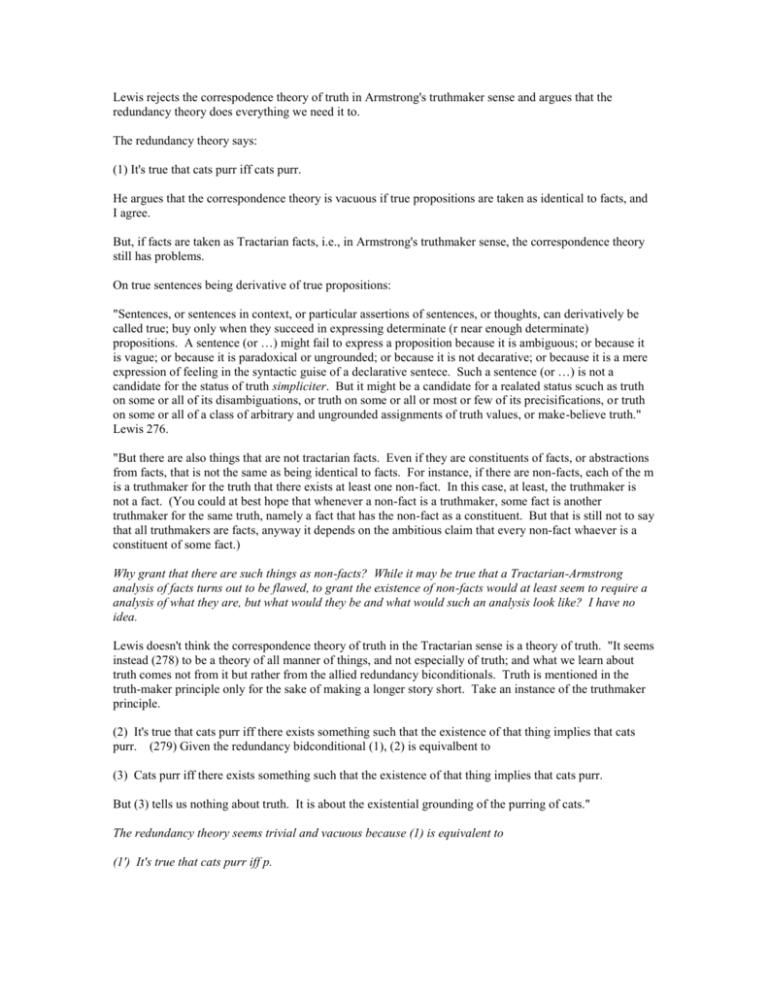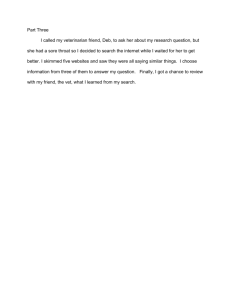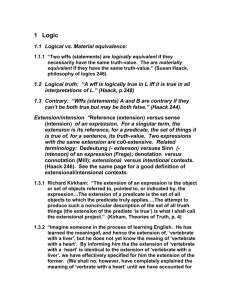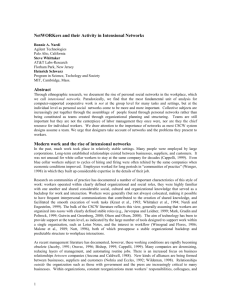
Lewis rejects the correspodence theory of truth in Armstrong's truthmaker sense and argues that the
redundancy theory does everything we need it to.
The redundancy theory says:
(1) It's true that cats purr iff cats purr.
He argues that the correspondence theory is vacuous if true propositions are taken as identical to facts, and
I agree.
But, if facts are taken as Tractarian facts, i.e., in Armstrong's truthmaker sense, the correspondence theory
still has problems.
On true sentences being derivative of true propositions:
"Sentences, or sentences in context, or particular assertions of sentences, or thoughts, can derivatively be
called true; buy only when they succeed in expressing determinate (r near enough determinate)
propositions. A sentence (or …) might fail to express a proposition because it is ambiguous; or because it
is vague; or because it is paradoxical or ungrounded; or because it is not decarative; or because it is a mere
expression of feeling in the syntactic guise of a declarative sentece. Such a sentence (or …) is not a
candidate for the status of truth simpliciter. But it might be a candidate for a realated status scuch as truth
on some or all of its disambiguations, or truth on some or all or most or few of its precisifications, or truth
on some or all of a class of arbitrary and ungrounded assignments of truth values, or make-believe truth."
Lewis 276.
"But there are also things that are not tractarian facts. Even if they are constituents of facts, or abstractions
from facts, that is not the same as being identical to facts. For instance, if there are non-facts, each of the m
is a truthmaker for the truth that there exists at least one non-fact. In this case, at least, the truthmaker is
not a fact. (You could at best hope that whenever a non-fact is a truthmaker, some fact is another
truthmaker for the same truth, namely a fact that has the non-fact as a constituent. But that is still not to say
that all truthmakers are facts, anyway it depends on the ambitious claim that every non-fact whaever is a
constituent of some fact.)
Why grant that there are such things as non-facts? While it may be true that a Tractarian-Armstrong
analysis of facts turns out to be flawed, to grant the existence of non-facts would at least seem to require a
analysis of what they are, but what would they be and what would such an analysis look like? I have no
idea.
Lewis doesn't think the correspondence theory of truth in the Tractarian sense is a theory of truth. "It seems
instead (278) to be a theory of all manner of things, and not especially of truth; and what we learn about
truth comes not from it but rather from the allied redundancy biconditionals. Truth is mentioned in the
truth-maker principle only for the sake of making a longer story short. Take an instance of the truthmaker
principle.
(2) It's true that cats purr iff there exists something such that the existence of that thing implies that cats
purr. (279) Given the redundancy bidconditional (1), (2) is equivalbent to
(3) Cats purr iff there exists something such that the existence of that thing implies that cats purr.
But (3) tells us nothing about truth. It is about the existential grounding of the purring of cats."
The redundancy theory seems trivial and vacuous because (1) is equivalent to
(1') It's true that cats purr iff p.
Here, p is the that-clause [that cats purr]. P is functioning here as an assertion, which is synonymous to
It's true that p. Thus, (1) is equivalent to
(1'') It's true that cats purr iff it's true that cats purr. And this is trivial and vacuous.
A deeper analysis is called for. WE might need a more complete or wide-sweeping analysis of facts than
Armstrong—one that does not just include particulars in the material world, but also properties of
intensional objects.
Why not replace 'implies' with entails. Or is entails circular when taken as makes true. Are we stuck?
(5) If F exists, then P is true.
(5) is necessarily true. What is the truthmaker for (5). It's analytic, so presumably the relationship
between the the properties and/or state of affairs and/or necessarly existing facts and/or propositions it
involves.
Is the assertion that cats purr equivalent to claiming that the fact of cats purring exists? I think so. It
could be the different claim that the states of affairs of cats purring obtains.
Lewis (279): Whatever the Party says is true
is equivalent to an infinite bundle of conditionals:
What does 'equivalent' mean here? Entails? Is synonymous to. Clearly, he can't mean the latter.
If the Party says that two and two make five, then two and two make five,
If the Party says that we have always been at war with Easasia, then we have always been at war with
Eastasia.
And so on, and so forth. Every item in the bundle is about the inerrancy of the Party, not about truth Even
those of them that pertain to what the Party might say about truth, thorugh indeed they do at least mention
truth, give us exactly no unconditional information about truth, and in that sense even they are not about
truth.
If the truthmaker principle amounts to a bundle of claims that are not at all about truth,…"
Here we can symbolize this as
(6) P, True P,
where P is something the party says, which is derivative of any proposition that the party asserts.
(6) is equivalent to
(7) If P, then True P.
Here, we must read 'is equivalent to' as 'entails', where I mean, if (6), then (7), not an equivalence in
meaning since (6) clearly doesn't mean (7). We can say they are extensionally but intensionally equivalent.
Intensional entities
Intensional entities are such things as concepts, propositions and properties.
What makes them ‘intensional’ is that they violate the principle of extensionality;
the principle that equivalence implies identity. For example, the concept of being
a (well-formed) creature with a kidney and the concept of being a (well-formed)
creature with a heart are equivalent in so far as they apply to the same things, but
they are different concepts. Likewise, although the proposition that creatures
with kidneys have kidneys and the proposition that creatures with hearts have
kidneys are equivalent (both are true), they are not identical. Intensional entities
are contrasted with extensional entities such as sets, which do satisfy the
principle of extensionality. For example, the set of creatures with kidneys and the
set of creatures with hearts are equivalent in so far as they have the same
members and, accordingly, are identical. By this standard criterion, each of the
following philosophically important types of entity is intensional: qualities,
attributes, properties, relations, conditions, states, concepts, ideas, notions,
propositions and thoughts.
All (or most) of these intensional entities have been classified at one time or
another as kinds of universals. Accordingly, standard traditional views about the
ontological status of universals carry over to intensional entities. Nominalists
hold that they do not really exist. Conceptualists accept their existence but deem
it to be mind-dependent. Realists hold that they are mind-independent. Ante rem
realists hold that they exist independently of being true of anything; in re realists
require that they be true of something.
1 History
2 Extensional reductions
3 Non-reductionist approaches
Copyright © 2002 Routledge, an imprint of the Taylor & Francis group. All rights reserved.
Equivalence doesn't equal identity intensionally speaking, but only extensionally speaking; there is more
than one sort of equivalence. George appears to call states of affairs "states."
If every item in the bundle is about the inerrancy of the party, why is this not about truth? To say that the
party is inerrant is to assert (6) which is clearly about truth. Moreover, how is Lewis using 'about' here,
because each of his enumerative examples is clearly about the inerrancy about (in the intensional sense)
the inerrancy of the party, but rather is entailed by, i.e., is extensionally equivalent to the inerrancy of the
party which is extensionally equivalent to (6).
The meaning of (7) doesn't contain information about the inerrancy of the party, but entails it.









